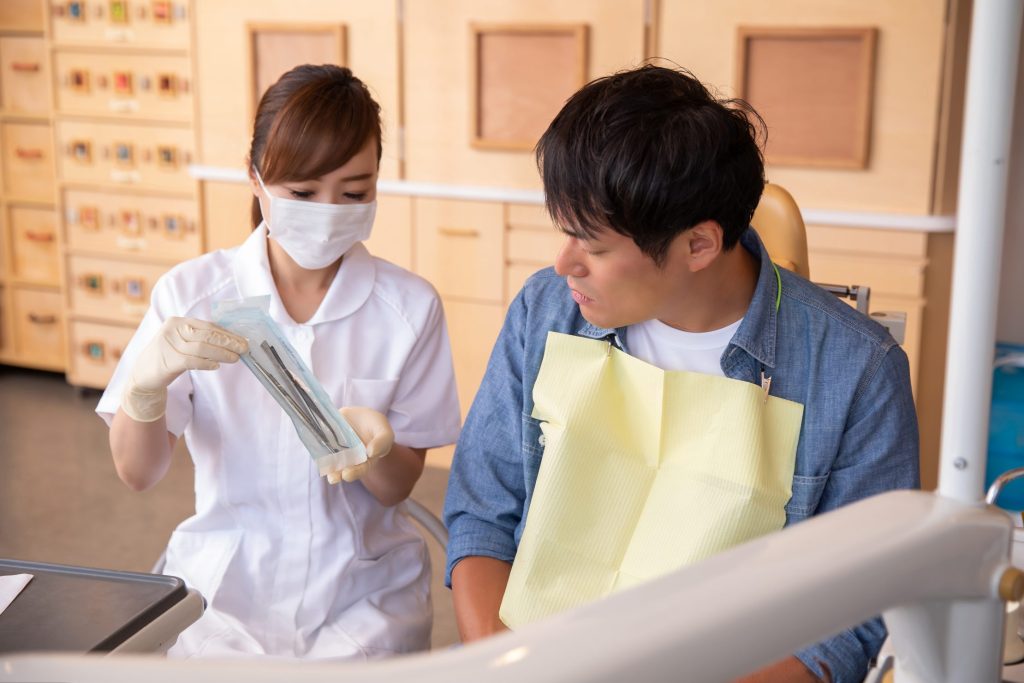Like natural teeth, dental implants can become infected with bacteria. A bacterial infection of a dental implant is actually a type of periodontal disease (gum disease) that is known as peri-implantitis. If left untreated for too long, a bacterial infection occurring around a dental implant can result in the loss of the implant in addition to other health complications.
What Is a Dental Implant?
A dental implant is a permanent tooth replacement that replicates a natural tooth’s structures with a screw-like portion that is made of biocompatible metal and a tooth-shaped dental crown. The screw-like implant portion of a dental implant is implanted directly into a patient’s jawbone. Through the healing process, the implant osseointegrates with the jawbone and then is able to hold the dental crown in place and mimic a tooth’s natural roots.
Signs Your Dental Implant Could Be Infected
Signs of an infection occurring around your dental implant (peri-implantitis) can be similar to the signs of regular periodontal disease. These signs and symptoms include:
- An implant that feels loose
- An implant that wobbles
- Red, puffy, or inflamed gum tissues around the dental implant
- Gum recession
- Gums near the implant bleed easily when brushed or flossed
- A foul taste in your mouth
- Persistent bad breath
- Pain, discomfort, or throbbing in the area of the implant
- The implant (or local area) hurts or aches when touched
- Pus (exudate) is visible in the area
- You can see the metal portions of the implant
- It hurts to chew or put pressure on the dental implant
- Fever
What to Do If You Experience Problems With Your Dental Implant
If you experience any signs or symptoms of dental implant infection, you should seek treatment immediately. Not only does peri-implantitis lead to bone loss and threaten the soundness of your dental implant, but bacterial infections that occur in and around the mouth are also a serious danger to your overall health. Since these infections can spread easily to other nearby areas, oral infections can be life-threatening if they are left untreated.
What Causes a Dental Implant to Become Infected?
Dental implant infections can occur as a result of several different lifestyle factors, oral health issues, and general health issues. Peri-implantitis can develop as a result of several issues that can also cause regular periodontal disease including:
- Poor or inadequate oral hygiene
- Tobacco use (smoking, vaping, or chewing tobacco)
- Autoimmune disorders
- Other health disorders that compromise the immune system
- Malocclusion
- Bruxism (clenching the jaw and/or grinding the teeth)
Additionally, systemic diseases such as diabetes and cardiovascular disease have also been linked to an increased risk of developing periodontal disease and peri-implantitis. Although dental implants are manufactured from biocompatible metals, some individuals can develop (or already have) allergies to these materials, and having an allergic reaction to a dental implant itself can result in infection.
How to Care for Your Dental Implant and Prevent Infection From Occurring
Except in the case of an untreatable systemic illness, immune disorder, or allergy, peri-implantitis can be prevented with lifestyle adjustments and proper oral hygiene. To care for your dental implant and prevent it from becoming infected, you should:
- Practice exceptional oral hygiene. Brush your teeth at least twice a day and floss at least once a day. We also recommend that patients with dental implants (and other dental prosthetics) rinse with alcohol-free, antibacterial mouthwash regularly.
- You might also consider using a water flosser in addition to brushing and flossing. Water flossers can help control bacterial growth by ensuring that the gum tissues around your dental implant are as clean as possible.
- Schedule a professional dental cleaning and examination at least once every six months (and more often if you develop periodontal disease or early signs of gingivitis).
- Stop using tobacco. (This is good for the rest of your body, too!)
- Work with your doctor to manage systemic health problems such as cardiovascular disease and diabetes.
- Eat a healthy diet to boost your immune system and keep your mouth healthy.
Additionally, to prevent dental implant infections from occurring, we do not recommend dental implants for patients with current signs or symptoms of any stage of periodontal disease. Instead, we recommend that patients work with their primary dental care providers to restore their oral health before beginning the dental implant treatment process.
Dental Implant Placement and Care With Our Advanced Prosthodontic Services in Loveland, Colorado
At Northern Colorado Implant and Prosthetic Dentistry, our board-certified prosthodontist is highly experienced in working with patients who are in the process of getting dental implants and also with patients who already have dental implants. Dr. Bock can guide you through every step of the dental implantation process, ensuring you receive impeccable care and have an outstanding treatment outcome. Additionally, he can continue working with you in the care, upkeep, and restoration (if necessary) of your dental implant.
To learn more about taking care of your dental implant or to schedule a dental implant consultation, we welcome you to contact Northern Colorado Implant and Prosthetic Dentistry today.






